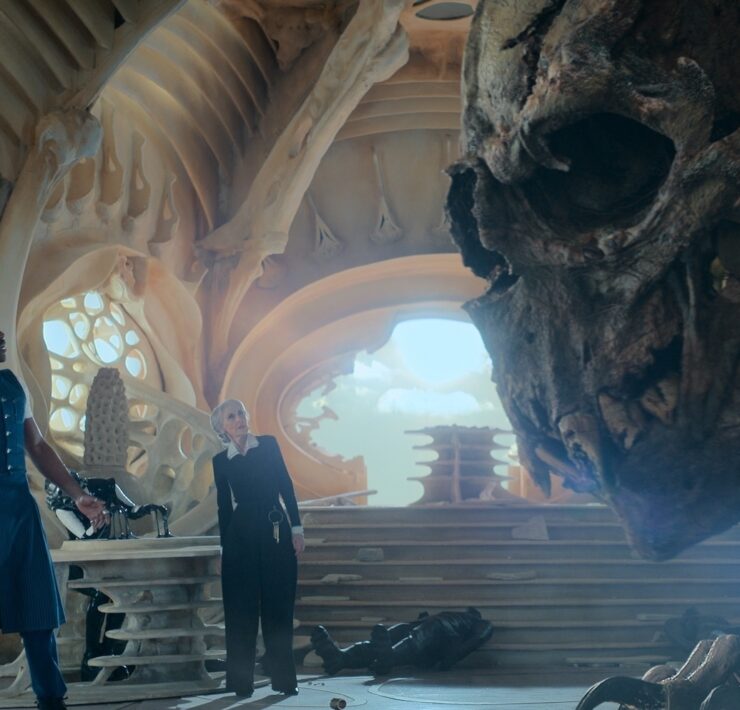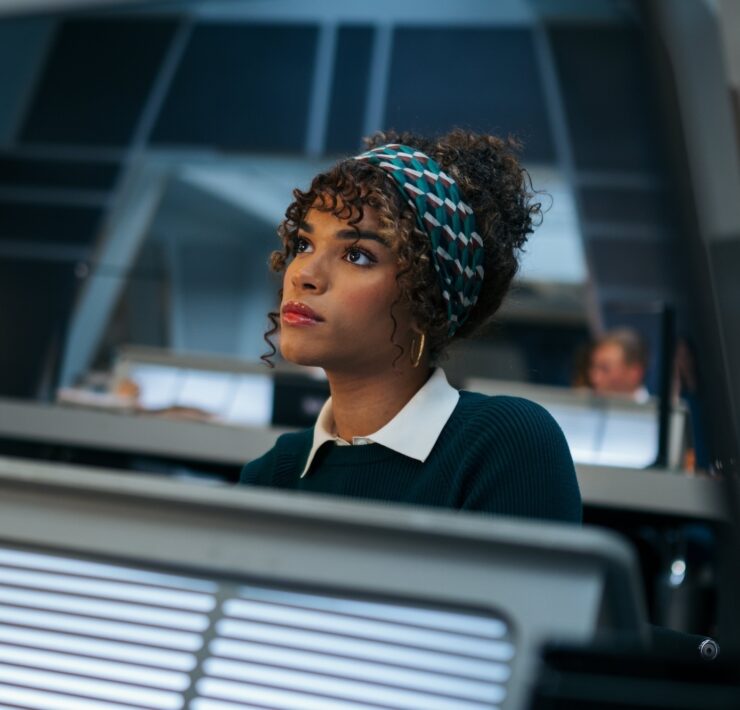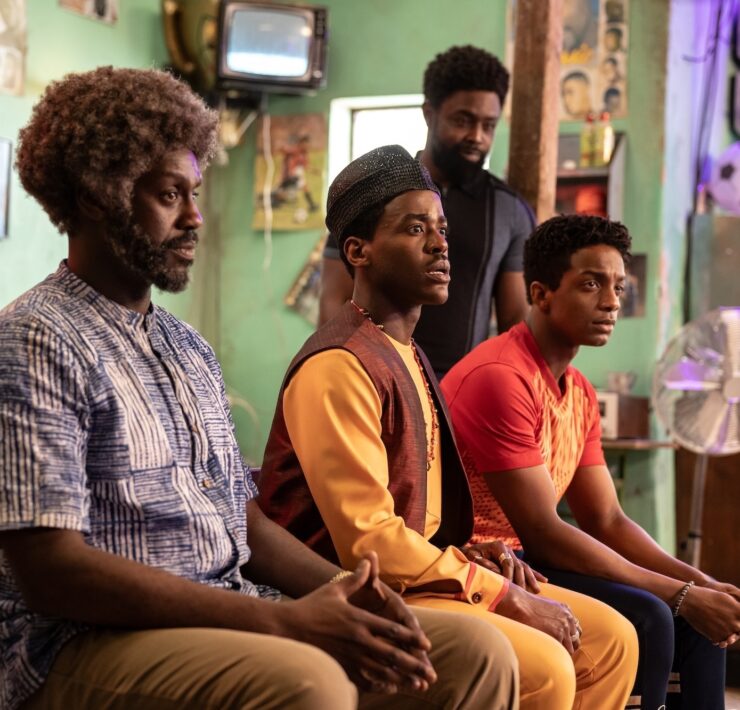TV Review: The ‘Doctor Who’ Episode ‘The Interstellar Song Contest’ Serves Up Major Surprises and a Pop-Culture Tribute
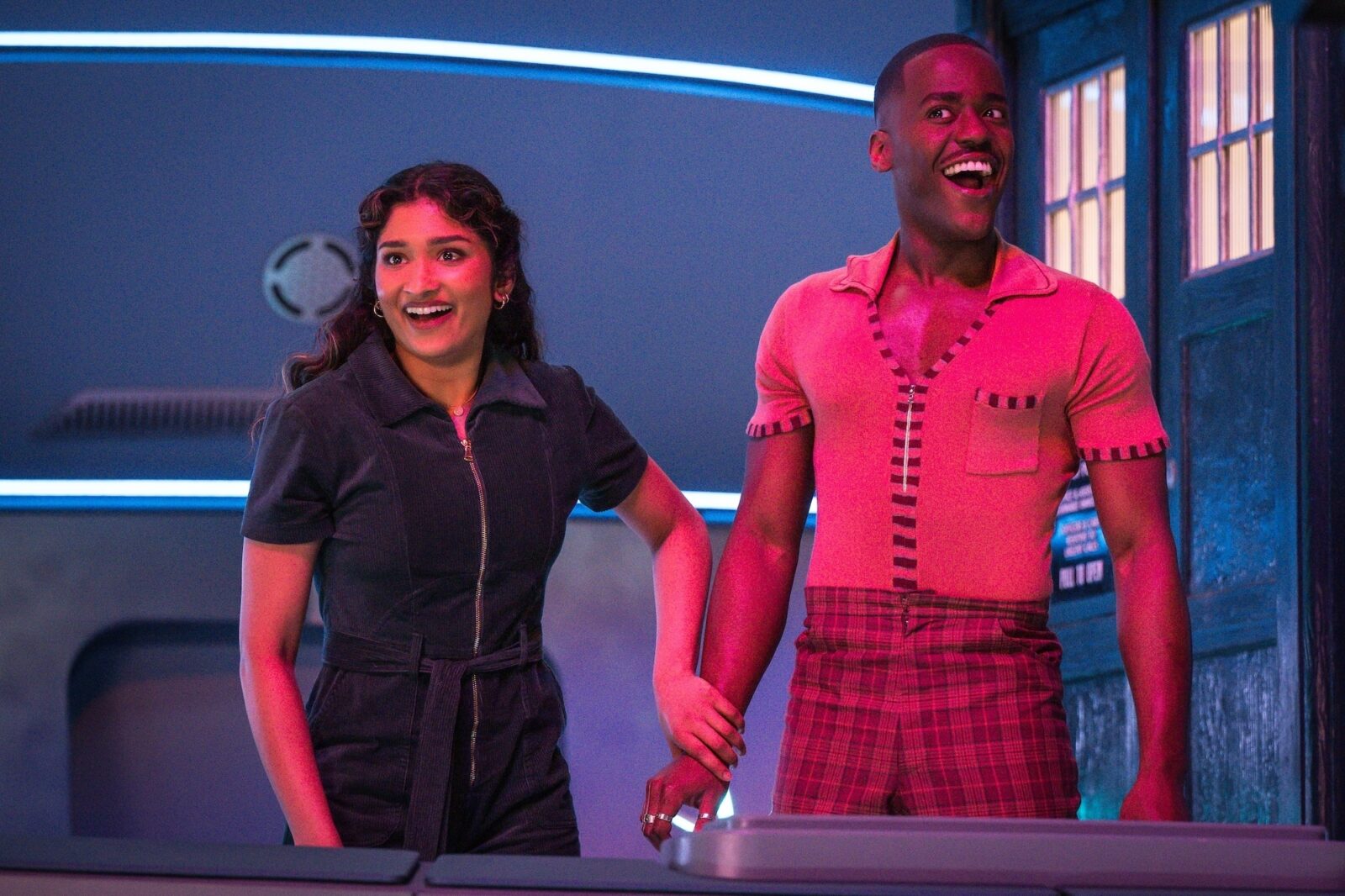
Julie River is a Denver transplant originally from Warwick, Rhode…
Another thing I love about Doctor Who is the twists and turns, the surprise comebacks, and the exciting sudden reversals. In other words, Doctor Who is cheap melodrama, and I love a good, cheap, melodrama. In the latest episode, “The Interstellar Song Contest,” the show offers up a lot of surprises in a quick amount of time, in addition to offering up a tribute to the popular Eurovision Song Contest even as the actual contest is taking place, as well as giving us the first episode in the history of Doctor Who to be written by an openly transgender person, namely the famous trans children’s author Juno Dawson, perhaps most famous for her book This Book is Gay. All of that combined to make one of the biggest and best episodes of an already great series, and one that will possibly be remembered as one of the last greats.
Since the episode is so deeply inspired by Eurovision, it might make sense to explain to Americans a little bit about what Eurovision is. The Eurovision Song Contest is an annual songwriting and singing competition organized by the European Broadcasting Union. Each European nation in the contest sends one original song and performer as their entry for the contest, with a complicated voting system that basically boils down to songs being voted on by the viewing public. The winning country of each year’s competition generally gets to host the next year’s Eurovision, a rule that has led to a lot of controversy, especially as Israel has hosted the competition three times. In the U.K., television personality Rylan Clark, who got his start on The X Factor, is co-presenter for the semi-final performance, while renowned Irish comedian and talk-show host, Graham Norton, hosts the finals.
Ncuti Gatwa himself, who plays the 15th Doctor, was scheduled to be the British spokesperson for this year’s Eurovision Song Contest, but pulled out due to “unforeseen circumstances.” Due to the timing of his cancellation, many took him pulling out as a protest of Israel’s qualification for the contest, which would be in keeping with Gatwa’s public stance on the conflict in Gaza. But there have been some who say that the episode “The Interstellar Song Contest” in itself had subtle nods to support of Palestine, not only in the episode’s themes of colonization and genocide, but also in the visual themes of the episode including the river at the center of the set design and the subtle use of watermelon imagery, which is associated with support for Palestine. Honestly, I wouldn’t put it past Doctor Who to express their support publicly like that.
And it’s at this point where I’m going to drop this week’s spoiler warning, so don’t read past here if you don’t want the episode spoiled for you.
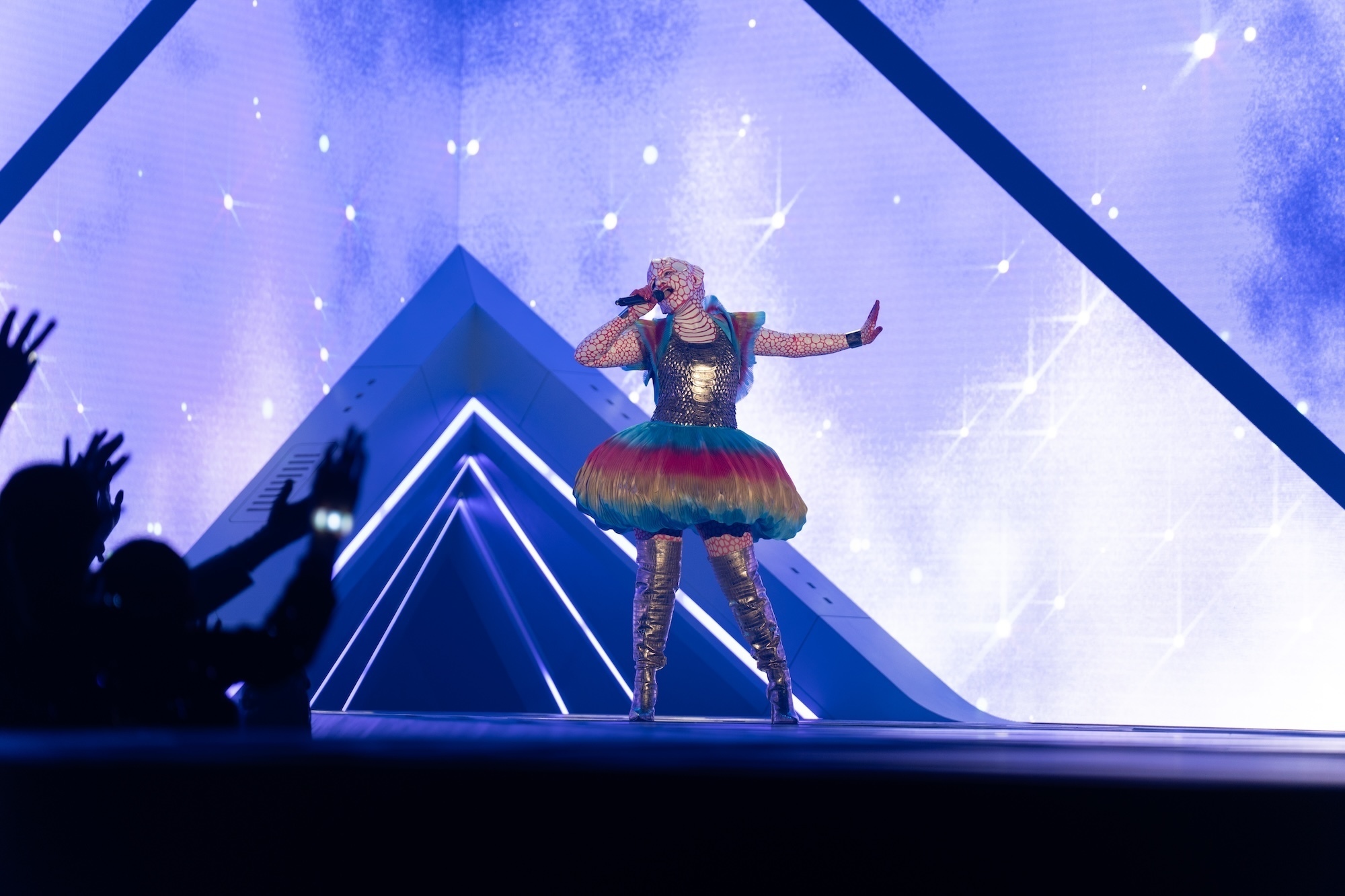
In the episode, The Fifteenth Doctor (Ncuti Gatwa) and Belinda (Varada Sethu), still trying to find a way to get Belinda home, land in the stadium that’s holding The Interstellar Song Contest, an extension of Eurovision that has spread to the stars and now encompasses planets from across the Universe, held in a floating space stadium called The Harmony Auditorium and hosted by a cryogenically-suspended Rylan Clark (played by himself). When a terrorist named Kid (Freddie Fox), and his accomplice Wynn (Iona Anderson), of the horned species the Hellions, launch a terrorist attack on the event, almost all the spectators, including the Doctor, are sucked out of the stadium into a gravity shell where they slowly start freezing to death.
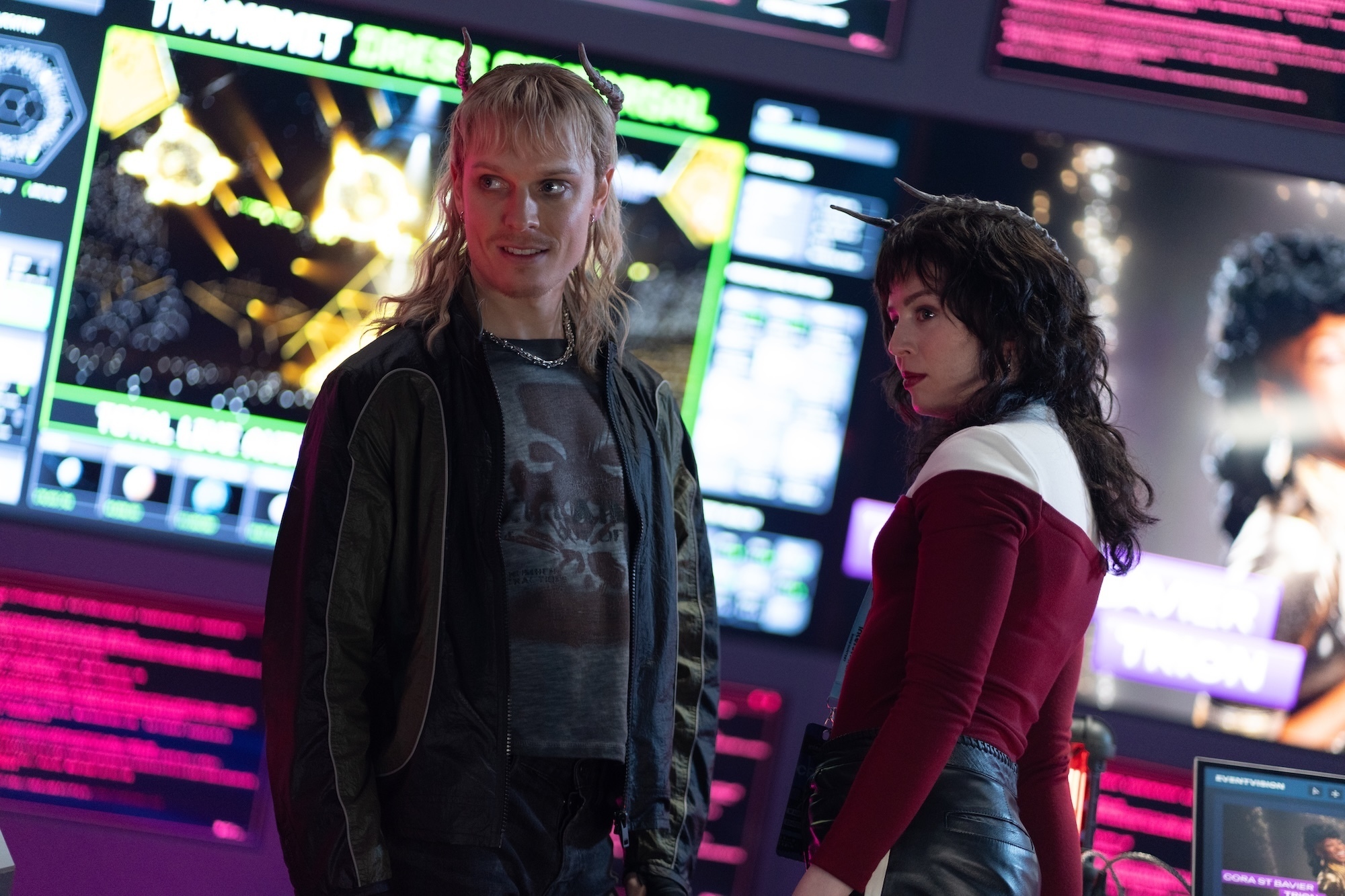
The Doctor, barely conscious, is shocked awake by visions of his granddaughter Susan (Carole Ann Ford)—a character I’ve written about before who has not been seen on the show since a cameo in the 20th anniversary special in 1983, and who hasn’t been a series regular since 1964. Susan urges the Doctor to keep fighting, and he finds a confetti cannon to shoot himself back to the stadium. There, he finds a lovely gay couple named Mike (Kadiff Kirwan) and Gary (Charlie Condou)—a nurse and a designer of the stadium, respectively—who help him regain control of the stadium from Kid and Wynn. The Doctor, thinking Belinda is dead, goes to a dark place and ends up torturing Kid as he outwits the terrorist.
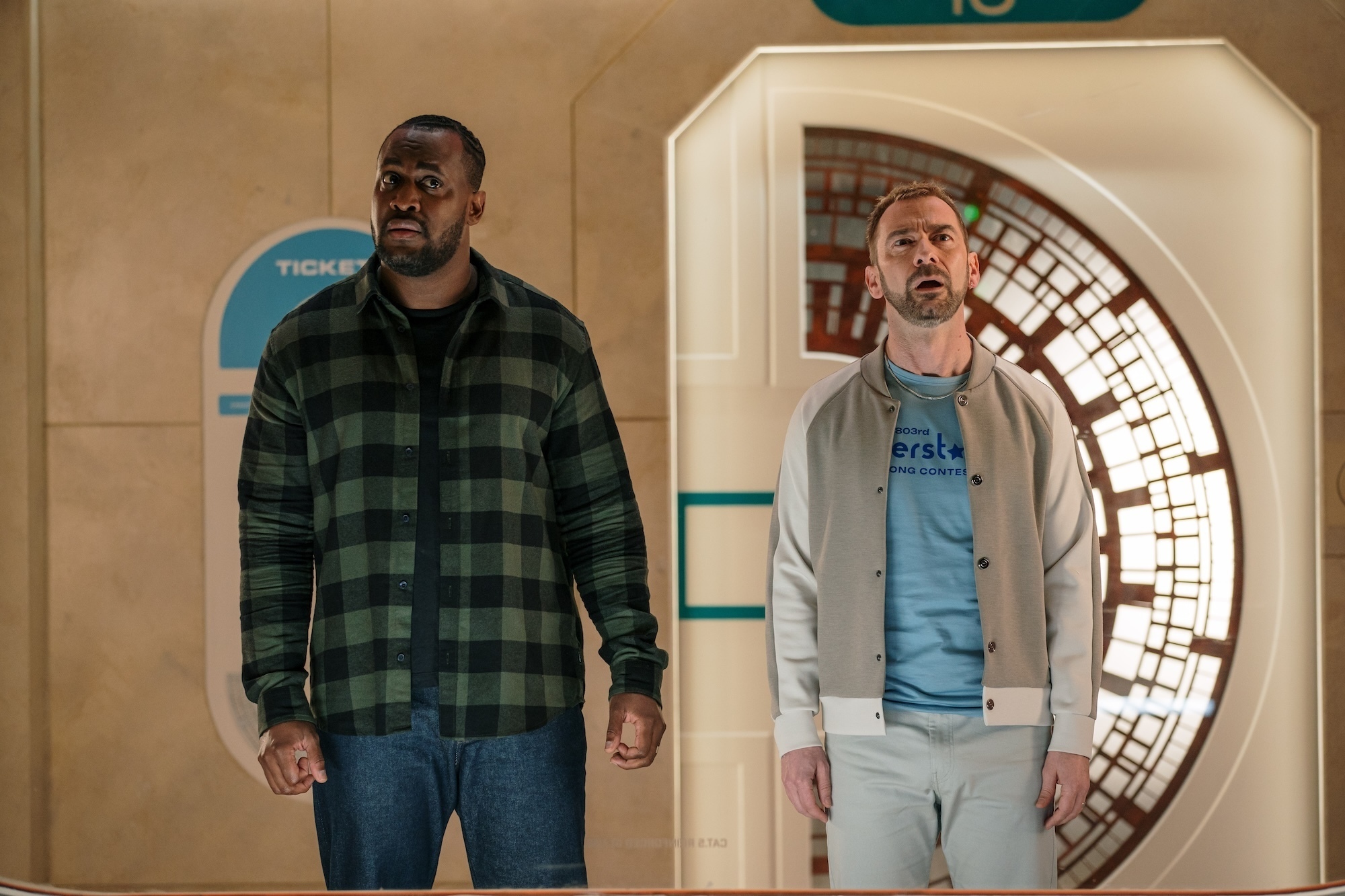
Meanwhile, Belinda, who narrowly escaped being ejected from the stadium, meets another Hellion named Cora (Miriam-Teak Lee) who explains that a company called The Corporation destroyed their home planet to harvest poppies for artificial honey flavoring. Cora has cut her own horns off to fit in with the rest of society, a clear metaphor for the extremes that some people, including transgender people, have to go through to fit into society. With the attendees rescued, the contest is called off, but Cora gets the opportunity to sing a song in honor of the planet Hellia for their 3 trillion viewers.
As the Doctor and Belinda are leaving, they find a hologram based on Graham Norton (again, played by himself) who tells them of the history of Earth, which was destroyed on May 24, 2025. Having learned about the destruction of the planet on the very day that the Doctor is trying to get Belinda back to, he hurries back to that date with a promise to save the world once again.
But after the Doctor leaves, the mysterious Mrs. Flood (Anita Dobson)—whose secret identity has been a source of speculation since her first appearance in the 2023 Christmas special “The Church on Ruby Road,” and who was an attendee at the contest—is revived, but admits that she’s already frozen her double brain stem, which is deadly to her as a Time Lady. With the Doctor gone, she attempts to regenerate, but instead bigenerates into two people (the second played by Archie Panjabi) and reveals herself to be The Rani, a classic series villain last seen in the 1987 serial “Time and the Rani.”
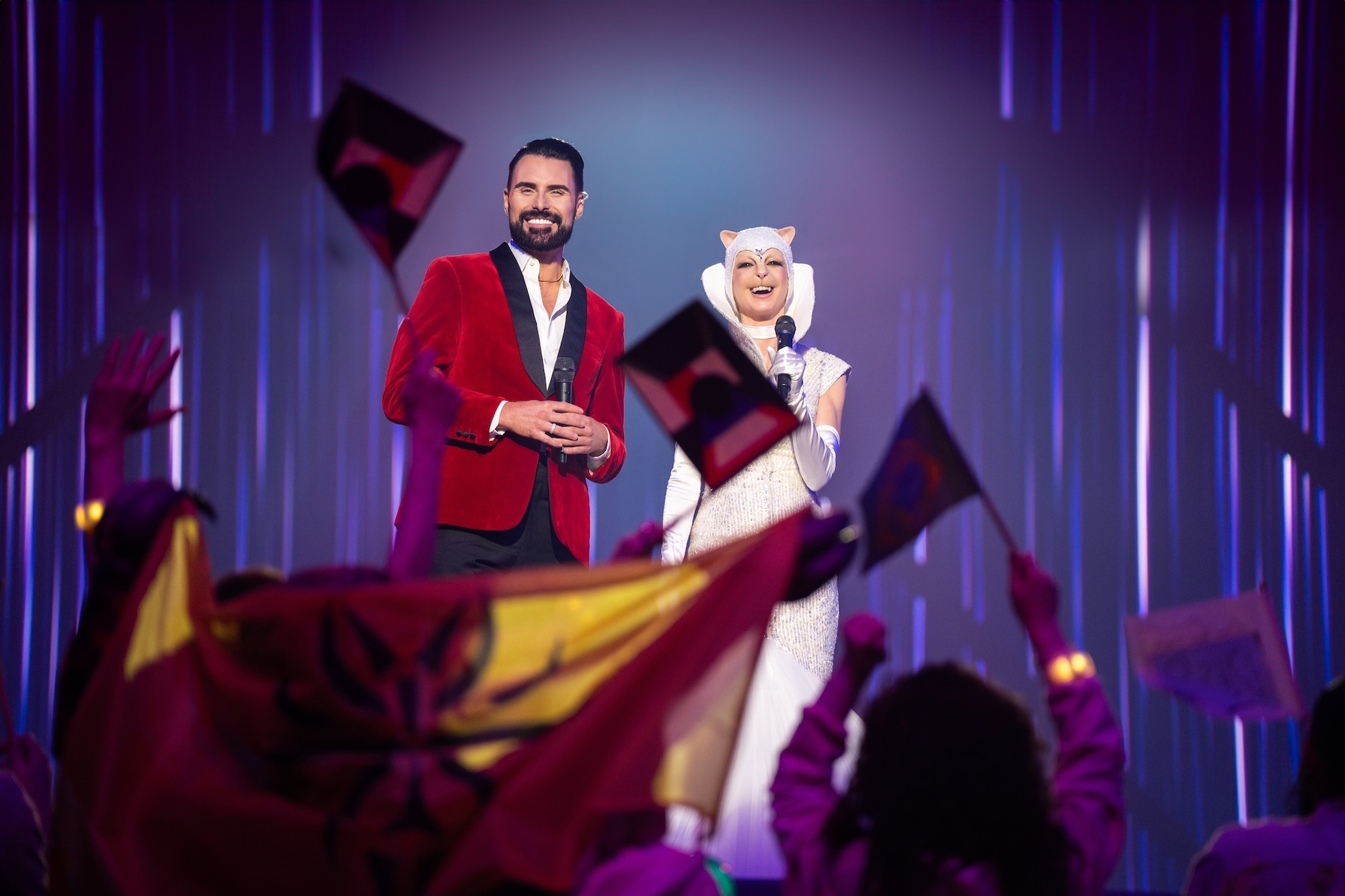
Since The Rani hasn’t been seen in some time, it might be worthwhile to take a moment to introduce her. The Rani, originally played by the late Kate O’Mara, only appears in two classic episodes, both of which bear the character’s name in the title. In the sixth Doctor (Colin Baker) episode “The Mark of the Rani,” the Rani, an exiled Time Lady who has become the leader of a planet named Miasimia Goria. Always a scientist, but rarely an ethical one, the Rani conducts experiments on her followers which have left them unable to sleep, and therefore difficult to control. So the Rani sets herself up in various chaotic periods in Earth’s history, such as the American Revolution and the Luddite Riots, where it won’t be noticed that she’s stealing the chemical from humans that allows them to sleep, leaving her subjects restless and violent.
In her second appearance, the seventh Doctor (Sylvester McCoy) episode “Time and the Rani,” we find the Rani has now taken over the planet Lakertya and enslaved its people. She schemes to collect all of the minds of the greatest geniuses in the universe, such as Earth’s Albert Einstein, which she will collectively use to create a time manipulator, which will allow her to control any point in time that she wishes. Naturally, in both cases, The Doctor and his companions—Peri Brown (Nicola Bryant) in the first episode, Mel Bush (Bonnie Langford) in the second—foil the Rani’s plans on both occasions.
While the plots of classic series episodes may seem silly by today’s standards, there’s one take-away to remember about The Rani, and that’s that she’s not just a megalomaniacal maniac. She is that, but she’d never admit that power is her main motive. To her, she’s a scientist, and all of her plans are based in trying to carry out scientific experiments that just happen to put her in power as a final result. And she has very little interest in the ethical concerns of science, often leaving a trail of victims of her experimentation in her wake. So if her entire plan this time around is just about power and not about an experiment of some sort, I’ll be surprised.
But the Rani also frequently mocked The Master for his petty rivalry with the Doctor and thought seeking revenge against him was rather silly. Even in her second appearance, she seemed more interested in using the Doctor as part of her plan than she was in getting revenge against The Doctor. Considering that the newest incarnation of The Rani seems hellbent on revenge against the Doctor, I have to assume something has changed. In her last appearance in 1987, she was taken prisoner by the beings she had enslaved, much thanks to the Doctor, but it seems unlikely that they haven’t seen each other since then. Presumably, there’s another reason the Rani wants revenge.
In the end, the episode offered a one-two punch of surprise appearances from the classic series, all wrapped-up in one of the show’s most exciting pop-culture tributes. All-in-all, it makes for one of the best and most exciting episodes of the entire series, and one that I’m especially proud to say was written by a fellow trans woman writer. The coming two-part finale promises to be very exciting after this groundbreaking set-up, and I can’t wait to see what promises to be the explosive finale of the modern era of Doctor Who.
Rating: 96/100
Doctor Who is now streaming on Disney Plus.
Featured photo courtesy of Lara Cornell/BBC Studios/Disney/Bad Wolf
What's Your Reaction?
Julie River is a Denver transplant originally from Warwick, Rhode Island. She's an out and proud transgender lesbian. She's a freelance writer, copy editor, and associate editor for OUT FRONT. She's a long-time slam poet who has been on 10 different slam poetry slam teams, including three times as a member of the Denver Mercury Cafe slam team.




